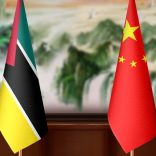Mozambique foreign currency rating affirmed at 'CCC+'; outlook negative; local currency 'SD' rating ...
Government intends to rationalise state business sector – State News Agency

Notícias / STEMA, the company that runs the grain terminal in the port of Matola is among the six that the state intends to restructure
Over half the companies in which the Mozambican state holds shares are not viable and are being sold off or liquidated, Finance Minister Adriano Maleiane announced on Monday.
Speaking at a meeting of the Consultative Council of the Institute for the Management of State Holdings (IGEPE), Maleiane said that the State Business Sector consists of 13 Public Companies, two state companies, and 109 companies in which the state holds shares. Of these 109 companies, only 45 are “potentially viable”, Maleiane said, while the other 64 “are in the process of being sold off, liquidated and dissolved”.
The state intervened in many of these companies to keep them going when their original owners fled shortly after independence.
Maleiane announced that in 2015 state businesses provided revenue of 688 million meticais (about 9.4 million US dollars, at current exchange rates). Most of this – 499 million meticais – took the form of dividends the state earned from its holdings in viable companies. The other 88 million came from the sale of state holdings.
In the first half of 2016, these companies provided the state with revenue of 286 million meticais – 277 million in dividends, and eight million from the sale of shares. Maleiane expected revenue to rise to 371 million meticais by the end of the year.
20 companies regarded as “strategic and viable” are being analysed, the Minister added, in order to restructure them financially, identify strategic partners, diversity and expand their products and services, consolidate their operations and rationalise costs.
Restructuring measures have already been adopted for six of these companies: the telecommunications company TDM, the mobile phone company M-Cel, the Mozambican Post Office, the Airport Company (ADM), Mozambique Airlines (LAM), and STEMA, the company that runs the grain terminal in the port of Matola.
He gave no details of this restructuring, but a possible merger of TDM and M-Cel has long been on the cards. As for LAM, its chairperson, Antonio Pinto de Abreu, cited by the independent television station STV, said the company’s debts currently amount to US$139 million. This is better than the situation six months ago, when the debt was US$160 million.
Malaiane claimed that “the restructuring under way will catalyse the development of the national economy through public-private partnerships, which will make viable state participation in major development projects”.
As for the companies regarded as non-viable, Maleiane said that 20 of them should be sold or liquidated by December, and this number should rise to 40 in 2017.
The government, he continued, wanted to see rationalisation in which the companies where the state has holdings become “more robust” and “capable of competing with other companies on the market”. For this to happen the companies required “corporate governance aimed at transparency, efficiency and equity, resting on improved models of management”.












Leave a Reply
Be the First to Comment!
You must be logged in to post a comment.
You must be logged in to post a comment.